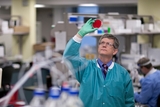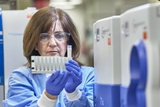Lysosomal Storage Disease (LSD) Center

The Lysosomal Storage Disease Center at Children's Hospital of Philadelphia (CHOP) provides comprehensive testing, treatment and management for children, adolescents and young adults diagnosed or suspected to have a lysosomal storage disease (LSD).
LSDs are complex, multi-systemic genetic disorders that affect the enzymes of various organs throughout the body. When enzymes don’t work correctly, they cause damage to organs and systems. There are more than 50 lysosomal storage diseases that can affect individuals from birth to adulthood. Many often have symptoms that are similar to other disorders, making them challenging to diagnose outside a specialty center.
At our center, patients can access an experienced team of specialists from across CHOP. Together, we work to detect and treat LSDs to achieve the best outcomes for patients.
How we serve you
Treatment for lysosomal storage diseases includes enzyme replacement therapy and bone marrow transplants to improve patient results. We work with families to coordinate services with a therapeutic team. View LSD treatment and clinics.
Conditions we treat
We evaluate and treat children with a variety of lysosomal storage diseases, including those listed below.
-
Mucopolysaccharidosis type I -
Mucopolysaccharidosis type II - Mucopolysaccharidosis (MPS) types III, IVA, IX, VI, VII
- Pompe disease (glycogen storage disease type II)
- Gaucher disease
- Fabry disease
- Multiple sulfatase deficiency
- Mucolipidosis types I, II (I-Cell), III, IV
- Lysosomal acid lipase deficiency/Wolman disease
- Alpha-mannosidosis
- Gangliosidosis (GM1 & GM2)
- Niemann-Pick types A, B, C
- Danon disease
- Metachromatic leukodystrophy

Why choose us
Our center combines excellent clinical care with access to active clinical research and new drug trials. Our team has been recognized as a center for excellence in the diagnosis and management of lysosomal storage disorders.

Meet your team
Your child will have access to experienced metabolic physicians, nurse practitioners, genetic counselors, neuropsychologists and social workers who coordinate and manage their care. We are available 24/7 to answer any questions you may have.

Our research
CHOP is a powerful hub for research on LSDs. We have disease registries for many disorders, allowing us to assess the natural history of these rare conditions and understand the benefits of enzyme replacement therapies.

LSD Center resources
Caring for a child with a lysosomal storage disease can be overwhelming. We have created resources to help you find answers to your questions and feel confident in the care you are providing your child.

What to expect
Before an appointment at the Lysosomal Storage Disease Center, we need to review the patient’s medical records. Learn what to send, when to contact your insurance company, and what to expect at your appointment and after your visit.

Learn about genomics and genetic testing
This educational module is designed to help you understand the basics of genomics and how changes in our genetic makeup can lead to various medical conditions. You’ll also learn about some common types of genetic testing that may be recommended by your doctor or genetic counselor.
Your donation changes lives
Philanthropic donations fuel breakthrough discoveries and lead to new treatments for children.
